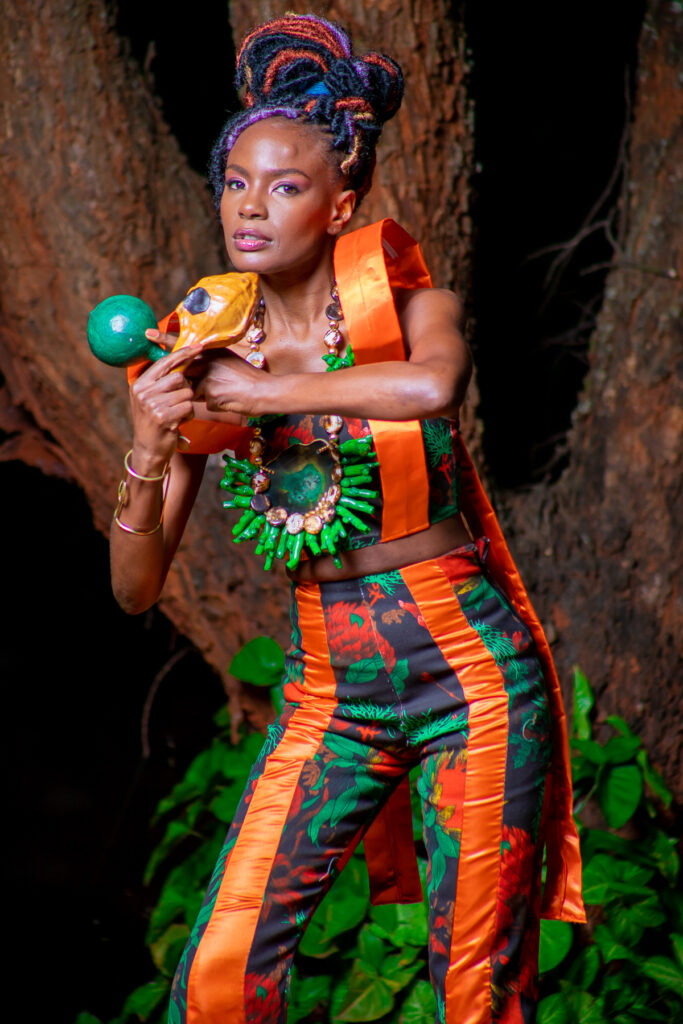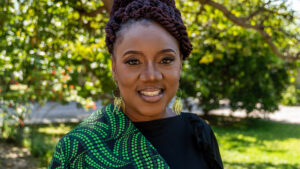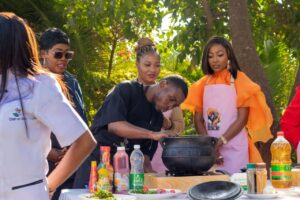Thank you I am grateful for this opportunity, you ladies at She Glows are doing a great job and I’ve already started telling people in the diaspora.
1) Would you kindly share a bit of your background with us
Shingai Shonhiwa is a Zimbabwean-British songbird who was born and raised in South London to freedom fighters who were in exile. My father passed away when I was 9 and so my mother had to brave raising us. I was born into a family that believed in nurturing our talents and kept us connected to our traditions as Zimbabweans. Amai Chipo (My mum) raised us with such a strong background of Ubuntu and cultural foundation. I initially wanted to be an actress, and for a while joined the Lost Vagueness crew as a burlesque performer. I also joined a theatre company called Second wave in the South- East London and got amazing acting training. I studied Circus Skills at a London Youth Club as a teenager. After my graduation I attended Art school and dabbled in local theatre. I then went on to study at the BRIT School for Performing Arts & Technology in Croydon and I am an avid writer.
2) Amazing, could you please tell us about your musical journey, how you came to find your sound?
My mum encouraged us to listen to music from home, eat food from home. We were exposed to melodies, music like Stella Chiweshe, Oliver Mtukudzi, Fela Kuti, Mirriam Makheba, Bob Marley so many different expressions of pop music rooted in African culture, music, rhythms and beats. I grew up with a lot of Zimbabwean musicians coming in and out of our house because my uncle Walla Danga who passed away a few weeks ago, was one of the biggest music promoters in the UK during 1980-1990s he had a club called Club Limpopo at the African centre and it was really a premium hub for African musicians and Caribbean artists he managed to fly in artists like Manu Debango, Bundu Boys, Kanda Bongo Man, Hugh Masekela and a really nourishing diet of lots of African music and it was a blessing to grow in that environment and after the shows, the artists would come home to have our African food like sadza. I also grew up in South London with a lot of dance music, house music you know the Nina Simones, Tina Turner etc and I was really lucky to inherit such a record collection from my parents. My mother encouraged me constantly and my brother too Kwayedza (Kwaye) who is also a successful musician in the diaspora and my sister Chipo who just had a massive Netflix debut on African Queen. We were encouraged to be creative and cultural. My mum was also into dressmaking and so I grew up with flamboyant gogos and aunties. In South London there was a diverse mixed culture. I’ve been fortunate to be raised in such a spectrum of culture.
3) What would you say has been the highlight of your career?
Setting up Zimtron which is my recording company, after the Noisettes. The word Zimtron is a play on words inspired by Zimbabwe and an open outlook on technology and African music records. The first independent release was containing coming home, which was an ode to paying homage to mbira music by bringing it forward in a futuristic contemporary way inspired by Thomas Mapfumo’s shumba, who is my uncle. To me, being independent and being able to release songs like Coming Home which has brought together people at home and in the diaspora, it has done really well in the past 3 years, I think it is an example of what we can do when we infuse our culture and contemporary music that we make. It’s important to have the confidence and bravery to do that because it’s a way that we are able to provide legacy for our timeless traditional music legacy that we will leave for people to enjoy. Also having a hit at home like Dzimba Dzemambwe is amazing.
4) What advice would you give to an upcoming Zimbabwean creative?
I know that sometimes Zimbabwean artists feel like that need to take on a different genre to grow in music but that’s not entirely true. Sometime ago when I was creating the song Coming Home, I was writing with Neyo and Will.I.Am, I played them the mbira they literally lost it, they were in awe of how amazing it sounded because they have mostly been exposed to West African music, the Fela Kutis and all. I feel like our tasks as artists is to be people who can uphold the Zimbabwean legacy where Zimbabwean culture can be celebrated in contemporary music. The song No fear is an encouragement to the Zimbabweans saying freedom is our birth right and we should embrace it. Authenticity is key, it’s not limited to just the mbira, it could be Ndebele or however you interpret the culture but as long as it is from an honest lense referencing how you grew up you will do well. It might take some time but you will have created a legacy of timeless music.
5) How was the experience of growing up as a Black Female in Britain? Was there ever a point
where you felt your environment clash with some of your African beliefs or principles?
It was traumatic in so many ways, having to go to schools where you are the only one constantly reminded about how you are different. You have to research for yourself and learn from your family members because the education system there is designed to keep them benefiting from what we experienced. Culture is how we reclaim, restore and revive our identity. Being a Zimbabwean-British means that we grew up severed from our culture, there is also the issue of language barriers, we want to come home but we don’t know how to integrate ourselves into the society. We are very proud of our heritage and culture as Zimbabweans but we grew up severed from our home so there is a lot of identity crisis, mental health crisis too and economically things are not what they may appear to be on social media because we haven’t had the chance to tell our story. The narrative has always been controlled. There is a lot of work to be done but I found how to rise above the grief and the onslaught that was caused by the colonial times. Music and creativity have been the best vehicle for me to navigate the circumstances and it has helped me to be the artist I am. It is important for me that whatever I have achieved in England has a positive impact at home.
6)Which Zimbabwean female artist do you most relate to and why?
Chioniso Maraira, because like me she comes from quite a prolific family heritage of musicians who have had deep connections with traditional music from Zimbabwe and its surrounding areas. She transcended genres and transcended orders. Her work has inspired and has been inspired by genres as fluid as Hip Hop, we saw that with Pieces of Ebony with Ancient, amazing deep layered mbira music, a beautiful lifetime journey to be on. I think for any artist to have that grounding is amazing, folk music, RnB, rebel music, warrior revolutionary anthems such as Rebel Woman. I listen to her music so often and I’m so grateful for her contribution because she was fearless in her legacy, in a sense that she was authentic and would always not just preserve our spiritual creative culture with her music but she took into the future as well and allowed it to sit in a very contemporary space where it was fun. So that’s why she is awesome, I love her humour, her wit. There is a bit at the end of one of her songs Zvichapera and you can hear her and the band laughing even though it was a serious song it ends on a playful note. Her laugh is infectious and I had the honour of performing with her at HIFA in 2014, she joined me and my band, The Noisettes, on stage for an incredible concert and we did Shumba by Thomas Mapfumo which would then turn into coming home. I love that she comes from a family of musicians like me, my brother Kwaye is a musician and my sister Chipo is also a singer, actress and producer.
7) What are your views on sanctions imposed on Zimbabwe, do you by any chance think they affect the music industry?
Zimbabwe has been so dragged sadly, especially in international media and it really sets us back in our confidence because it’s not fair for us to suffer because the West was and still is unhappy about the way we gained independence and in which we want to move being in the spirit of Ubuntu. Unfortunately, the west still has a hold over international media and they say a lot about post-colonial countries that after a while it starts to wear us down economically and in all aspects because we start referencing and assimilating their agenda. You can’t be oppressing, dragging and insulting and benefiting from those people at the same time. When the West makes these moves of deliberately impeding developing nations, plates they still eating from, it contradicts the West’s principles of democracy and ideals, by deciding to propagate propaganda in the Western media it affects us back home and not just the political or economic sectors only but culturally too and eventually we lose our confidence, because people who are supposed to be encouraging our confidence are the artists, the writers, fashion designers, journalist, artists and they are all attacked. We have gone through a lot and are still going through a lot. I feel as an artist I also have the mantle to reclaim, restore, revive and celebrate our culture. We have contributed a lot to the Western art, they are still buying our paintings and hogging them in their institutions, they are still holding on to so many cultural artifacts, instruments of power that used to remind us of who we are, so for me it’s not okay for them to be enjoying the mbira in Surrey but having the heads of our cultural leaders in their basements. A narrative of being lesser has been fed into the mainstream media such that even the pictures of Mbuya Nehanda and Sekuru Kaguvi that are peddled are of them in chains and stripped bare of their dignity yet we were nations that had gold in them surely they must have had some gold bracelets adorning them, they were great symbols of power, that’s why in Dzimba dzemabwe Winky D and I were depicted as Mbuya Nehanda and Sekuru Kaguvi.
8) What are your sentiments on men and women being equal?
Countries in the world that are the most far behind in terms of progress, peace and economic strength are the ones that have really bleeding imbalance in terms of how women are treated. The countries and nations where women are the most oppressed are countries that are the most behind and are the least at peace, and are the least likely to make progress. The middle East is a good example of this in terms of their systematic suppression of women and girls. Things continue to deteriorate for them on a scale that cannot be comprehended.
I do not believe in reverse sexism but I recently got into a case that really moved me, which was that when we shot the video for Dzimba Dzemambwe, there is a scene in the video where we depict a Zimbabwe that we don’t want, so we are showing in the scenes of the video the epidemic of drug abuse coming from outside which is a male dominated industry, a lot of things holding Zimbabwe back, child marriage was a really big one that is a huge cause of concern to my heart as a woman, as a sister, as an aunt, as a niece, as a granddaughter to see how little protection the African girl child is still having in a country that wants to be looked at as progressive. It really breaks my heart and what broke my heart further is that a lot of people went into the public eye to speak up about being disturbed by political references in the video and in the song than to be disturbed by the scenes of the violent scenes of child marriages in the video. My niece plays the character and she was so brave, we had to prepare her really well for that scene so that she understood what was the role she was playing. She was only 11 when we shot that video and at the time the video came out, there was an 8-year-old girl that had given birth in Bindura. That was heart-breaking.
I do not believe in sexism and countries that refuse to address violence and the suppression of women, are likely to not show any progress because there is no blessing for them as a nation or as a people because you continue to disrespect the source from which you came. Zimbabwe was given 500 million Euros from the EU to tackle gender based violence, I feel like the evidence is so obvious in that our actions to end the scourge need to be louder than words.
9) What are your sentiments on collaborations?
I love collaborations, they are really key to me in bridging the gap between the diaspora and people at home which why I love what She Glows is doing in celebrating a spectrum of women doing amazing things and if I can be just a brick in the building of the bridge between Zimbabweans in the Diaspora and at home doing amazing things, I am most grateful. I’ve been working with art collectives such as CaliGraph, we commissioned them to paint an incredible set of murals on an AVM chicken bus which was on the music video of No Fear and that is an icon Zimbabwean brand which brings back with it memories of having bicycles, chickens, goats and baskets on the carrier. I really want to revive Zimbabwean brands that were not celebrated due to lack of confidence. So I love collaborations, my next single is going to be in collaboration with a Zimbabwean artist and its coming out on the 7th of April which I’m really excited about. I’m excited to work with Zimbabwean brands. I’m so blown away by the entrepreneurial sector in Zimbabwe, I find it invigorating, adaptive and an amazing symbol of our resilience. I love what people like Alice Tagwira are doing.
10) Could you please share with us some final words of wisdom?
We have to remember as Zimbabweans that the shoulders we are standing on they don’t just have to Zimbabwan, we need to own who we are like Lupita N’yongo who hasn’t tried to assimilate into the Hollywood culture or try to lighten her skin or change her hair to fit the western narrative, Danai Gurira and Chipo Chung too who is Zimbabwean-Asian. We need to stand in our authenticity in all aspects. To the artists coming up who think if they put too much of their Zimbabweanness into their music then it ruins their prospects on an international platform, I urge them to rethink and try to bring authenticity into the music. It may take longer but you will have created music that is more timeless and you’ll have a genuine audience that you will have created. Culture revival is the secret to our success.






